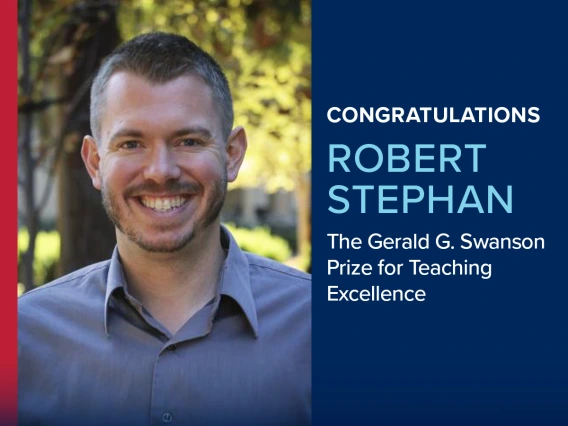
Known among students and colleagues for the passion and enthusiasm he brings to teaching Classics, Robert Stephan is a recipient of the University of Arizona’s 2021 Gerald G. Swanson Prize for Teaching Excellence.
Stephan, an Assistant Professor who has been with the Department of Religious Studies and Classics since 2016, teaches courses on classical history and civilization, classical mythology, the reception of classics in the modern world, ancient sport and spectacle, and the Greco-Roman economy.
“In leveraging the ancient past, I attempt to teach students the skills to process information from a wide variety of sources, understand biases, construct and communicate powerful arguments, and reflect on one’s own beliefs,” he said. “In a rapidly changing, increasingly globalized world, these are exactly the type of transferable skills that our students need to succeed beyond the walls of the academy.”
The award is designed to recognize excellence in undergraduate teaching and was created through a gift from the Thomas R. Brown Foundation in honor of Gerald G. Swanson, the beloved economics professor who passed away last year. The award comes with a check for $5,000.
The Swanson Prize is the latest in a string of honors for Stephan, who last year received the College of Humanities Distinguished Teaching Award and in 2019 received the College’s Distinguished Undergraduate Advising/Mentoring Award.
“Your dynamic approach to teaching is remarkable, creating a student-centered learning environment, using technology to enhance the learning experience, and encouraging and inclusive environment,” wrote Provost Liesl Folks in notifying Stephan of the award.
A large part of Stephan’s teaching philosophy traces back to his experiences as a student, when an “Intro to Field Archaeology” course shook him out of the typical back-of-the-class disengagement.
“I hung on every word the professor spouted about dusty tombs, broken pottery, and scattered bones. It was like someone had dropped me in the middle of a National Geographic special. Looking back on it, part of it was the material – I still find archaeology fascinating – but so much of it was the passion and enthusiasm with which the professor conveyed that material,” Stephan said.
As he took charge of his own classroom, enthusiasm and passion became a not just personal cornerstone of Stephan’s style and approach to teaching, but a proven, data-driven strategy to helping students connect with the material.
“If I can get the shy kid in the back of class to sit a few rows closer, listen a little more intently, and put down their iPhone, I am well on my way to achieving the learning objectives set out for the course,” he said. “When learning becomes something we’re excited about our work in the classroom improves and, perhaps more importantly, we begin to cultivate a lifelong interest in discovering more about the rich, diverse world in which we live.”
Karen K. Seat, Head of the Department of Religious Studies and Classics, said that not only has Stephan attracted thousands of students to his popular courses, but as director of undergraduate studies, Stephan has been instrumental in the department’s successful efforts to increase the number of students majoring in Classics.
In her nominating letter, Seat wrote that Stephan’s courses are “wildly popular” and glowing evaluations from students are not only the norm, but “truly moving.”
“In everything he does, he brings his uniquely infectious enthusiasm and students respond. A consistent theme in student testimonials is how Dr. Stephan put them at ease as nervous freshmen entering large lecture halls for the first time, and how he always made the time to help them overcome stress and uncertainty in pursuing their studies,” Seat wrote. “He is a gifted and hardworking educator, adept at providing students with high-caliber educational experiences both in-person and online. Thousands of students and alumni will remember him as one of the highlights of their Wildcat experience at the University of Arizona.”
Stephan said his goal is to “use his passion for Classics and teaching as an inspirational tool to draw students into the learning process, and then to use evidenced-based teaching methods to allow students to actively develop these skills for themselves.”
Those practical methods include making sure to explain to his classes the reason they’re doing each activity, and how it helps connect themes of the past to the present. And, even in large lecture classes, he makes a point of providing personalized, substantive feedback for students during the learning process, so students can adapt and improve during the course. He also keeps students active in small groups, which allows them to work together while he gives more personalized feedback.
“The worlds of ancient Greece and Rome provide an excellent opportunity for students to explore cultures and identities different from their own, while fostering critical as opposed to dependent thinking,” he said. “Today, I strive to give my students an experience similar to the one I had almost two decades ago, inspiring a passion for knowledge, helping them ‘learn to learn,’ and giving them the tools to actively develop real world skills.”

